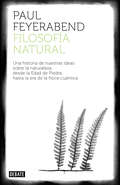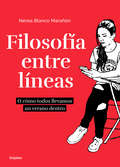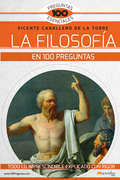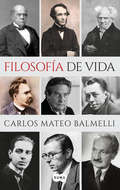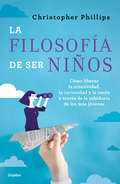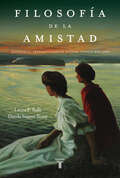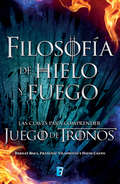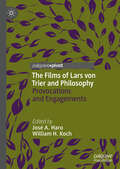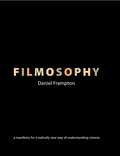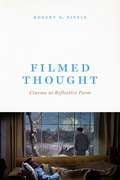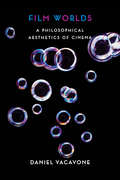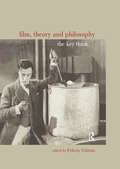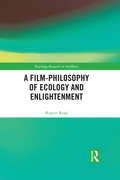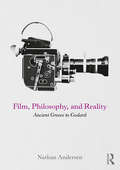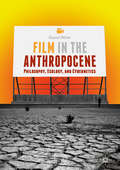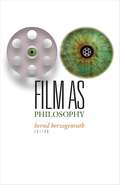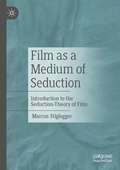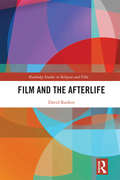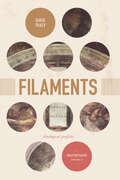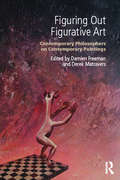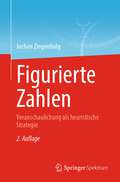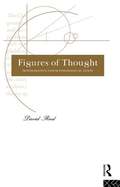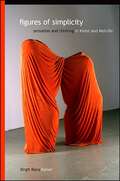- Table View
- List View
Filosofía natural: Una historia de nuestras ideas sobre la naturaleza
by Paul FeyerabendUna historia de nuestras ideas sobre la naturaleza desde la Edad de Piedra hasta la era de la física cuántica. La obra póstuma de Paul Feyerabend, uno de los filósofos más importantes del siglo XX. Paul Feyerabend fue uno de los científicos más originales y controvertidos de su tiempo. Su «todo vale» se ha convertido en un lema, y la claridad en la exposición de sus ideas atrajo al público dentro y fuera de las universidades. Filosofía natural pretende reconstruir la historia de las concepciones humanas de la naturaleza desde sus primeras expresiones en las pinturas rupestres de la Edad de Piedra hasta las discusiones del siglo XX sobre física nuclear. Publicada con más de treinta años de retraso, fue concebida originalmente como una obra en tres tomos que nunca llegaron a escribirse. El manuscrito se dio por perdido durante mucho tiempo, hasta que una copia mecanografiada apareció en los archivos de la Universidad de Constanza. Paul Feyerabend examina el significado de los mitos desde los albores de la filosofía natural hasta Parménides, y centra sus reflexiones en el crecimiento devastador del racionalismo durante la antigüedad griega y la consecuente separación del hombre y la naturaleza. Reseña:«El texto póstumo de Paul Feyerabend animará a buscar una nueva interpretación de la naturaleza y una mejor forma de vivir.»Neue Zürcher Zeitung
Filosofía entre líneas: O cómo todos llevamos un verano dentro
by Nerea Blanco MarañonRelatos de filosofía para la vida real. La filosofía está entre las líneas de esta historia tal y como lo está entre nuestros días, en las situaciones más cotidianas, oculta y a la vez a la vista de todos. Nos acompaña desde que nos levantamos con Sartre un lunes por la mañana hasta que gritamos embriagados en un concierto abrazados a la idea del Superhombre de Nietzsche. Este libro descodifica las emociones, miedos y esperanzas de los habitantes del siglo XXI. Nos hace entender nuestro presente y nuestra vida a través del pensamiento crítico. Se trata de un texto afilado, reivindicativo y feminista a ritmo de rock and roll. No es un disco, ni un ensayo, ni una novela, ni una autobiografía, aunque al mismo tiempo es, en realidad, un poco de todo esto. Se tenía que decir y se dijo: la filosofía is not dead.
La Filosofía en 100 preguntas (100 Preguntas esenciales)
by Vicente Caballero de la TorreLos temas clave para sumergirse en el apasionante y complejo mundo de la Filosofía, ordenados por temas y descritos con rigor académico en un lenguaje ameno y divulgativo. ¿Qué es la Filosofía?, metafísica, ontología, los límites del conocimiento, el hombre en el cosmos, filosofía de la religión, filosofía y economía, sociedad y política, arte y estética. Todas las respuestas a las preguntas que siempre se ha hecho. ¿Sabías que la filosofía oriental está tan de moda porque vivimos en tiempos de crisis?, ¿Existe Dios o nos lo hemos inventado?, ¿Cómo podemos distinguir las paraciencias de las ciencias?, ¿Qué quiso decir Descartes con su «Pienso, luego existo»?, ¿Tenemos un cuerpo o somos nuestro cuerpo?, ¿Somos realmente libres o la libertad es una ilusión?, ¿Se pueden educar las emociones?, ¿Necesitamos realmente vivir en sociedad o estaríamos mejor en soledad?, ¿Será posible la paz para siempre?, ¿Sabías que los economistas discuten más por Filosofía que por Economía?, ¿Hay una belleza objetiva o cualquier cosa puede ser bella para alguien y fea para otro?
Filosofía de vida
by Carlos Mateo BalmelliEl nuevo libro de Carlos Mateo Balmelli, una de las personalidades políticas más sobresalientes de Paraguay hoy, y quien en los últimos años ha venido publicando una serie de novelas donde trata temas como el amor, la injusticia, la audacia de querer cumplir con los sueños y la búsqueda de la belleza, mezclando algunos personajes reales con otros de su potente imaginación. En Filosofía de vida, Carlos Mateo Balmelli configura un libro lúcido, honesto y muy consciente de que toda biografía siempre tiene algo ajeno porque el que escribe, al hacerlo, inexorablemente se transforma en otro. Las lecturas filosóficas, literarias y políticas heredadas de su padre se entremezclan con jugosas anécdotas que incluyen los primeros contactos con la muerte, un viaje iniciático a Alemania -donde el protagonista pretende estudiar en una lengua desconocida- y el descubrimiento del amor con todas sus virtudes y miserias. La búsqueda incansable de la belleza, el sacrificio sin concesiones del mundo de la política, la literatura como vía de escape siempre a disposición, las relaciones fundantes que marcan a fuego a una persona y esas contradicciones divinas que condensan nada menos que la humanidad son algunos de los temas de este libro impactante, que se propone algo tan sencillo como colosal: exponer, confesar o simplemente ofrecer la experiencia adquirida a lo largo de una vida intensa.
La filosofía de ser niños
by Christopher PhillipsCómo liberar la creatividad, la curiosidad y la razón a través de la sabiduría de los más jóvenes. La niñez es nuestra plataforma de despegue, el periodo de la vida en el que el aprendizaje es más intenso, y adquirimos el conocimiento crítico y las habilidades que nos permitirán adaptarnos. Filósofos de todas las épocas han señalado que, con el paso del tiempo, los seres humanos tendemos a encogernos mental y emocionalmente. Desvirtuamos nuestra naturaleza -caracterizada por la curiosidad, la empatía, la razón, el asombro y el deseo de experimentar y entender- y, de esta manera, se va volviendo borroso nuestro sentido de identidad. Comenzamos nuestras vidas con un estallido moral, intelectual y creativo. Siguiendo las evidencias científicas que así lo demuestran, Christopher Phillips advierte que la niñez no es simplemente un estado de desarrollo, de transformación -de llegar a ser-, ni la adultez un momento de plenitud o acabamiento. Si aprovechamos las cualidades propias de la niñez, no estaremos condenados a volvernos seres desanimados y frágiles, sino que creceremos y viviremos guiados por el asombro, la curiosidad, la imaginación, el sentido de juego y la compasión. Explorando y explotando la filosofía de ser niños, podremos desarrollar ilimitadamente nuestro potencial. Vinculando filosofía, ciencias sociales, investigación neurocientífica y anécdotas personales, este libro propone una aproximación radicalmente distinta al tema de la frontera entre niñez y adultez, para mostrarnos que la forma como los niños ven y viven el mundo puede ser una clave para un desarrollo pleno, para alcanzar eso que los griegos llamaban areté o excelencia.
Filosofía de la amistad: Experiencia, sentido y valor de nuestro vínculo más libre
by Laura F. Belli Danila Suárez ToméUna invitación a pensar, desde la filosofía, el modo en que nos relacionamos con otros a partir de la afectividad, la reciprocidad, el cuidado y la confianza. Riguroso y original, ofrece elementos consistentes y provocadores para el debate y la reflexión crítica sobre una forma de vínculo central en la vida humana. La amistad ha sido materia del arte y la literatura, y objeto de estudio de un sinnúmero de disciplinas que van desde las ciencias sociales hasta la genética pasando por la matemática. Pero ¿qué es en sí misma? ¿Qué distingue a la amistad del amor romántico o filial? ¿Cuáles son las características de esta experiencia humana que se despliega y materializa en vínculos y relaciones abiertos a la afectividad, la reciprocidad, el cuidado y la confianza? ¿Cómo la pensó la filosofía? Laura F. Belli y Danila Suárez Tomé -filósofas y amigas- exploran qué significa la amistad en la historia de las ideas y qué formas asume en la actualidad; qué la hace tan intrínseca, existencial e íntimamente humana, tan cotidiana al tiempo que tan enigmática. Original en la construcción de su objeto, consistente y riguroso en su abordaje, este libro provocador y apasionado da cuenta de la amistad desde la perspectiva del pensamiento filosófico, pero también de sus configuraciones contemporáneas declinadas en falsos amigos, frenemies, amigos virtuales, animales no humanos, y sus reconfiguraciones desde las propuestas de los feminismos.
Filosofía de hielo y fuego: Las claves para comprender Juego de Tronos
by David Bernat Francesc Bernat Roca Vilaprinyó Francesc Canto¿Conoces los secretos detrás de los impresionantes personajes, increíbles episodios y escenografías asombrosas de Juego de Tronos? ¿Sabes de dónde surgió todo el fascinante mundo de esta serie? Descubre qué tiene que ver esta increíble y exitosa saga de George R. R. Martin con conocidos filósofos como Maquiavelo o Nietzsche, escritores como Shakespeare o Thoreau, personajes históricos de la realeza y algunos términos del psicoanálisis a través de este maravilloso libro. Sobre Juego de tronos, es el mismo autor quien nos advierte “Quiero que mis lectores y mis espectadores tengan miedo cuando mis personajes están en peligro, quiero que teman pasar la página porque puede que el personaje no sobreviva”.
The Films of Lars von Trier and Philosophy: Provocations and Engagements
by José A. Haro William H. KochThe films of Lars von Trier offer unique opportunities for thinking deeply about how Philosophy and Cinema speak to one another. The book addresses von Trier’s films in order of their release. The earlier chapters discuss his Golden Heart trilogy and USA: Land of Opportunities series by addressing issues of potential misogyny, ethical critique, and racial justice. The later chapters focus on his Depression Trilogy and address the undermining of gender binaries, the psychoanalytic meaning of the sacrifice of children and depression, and philosophical questions provoked by the depiction of the end of the world. Taken together, the volume explores the topics of Philosophical Psychology, Social Theory, Political Theory, Theories of the Self, Philosophy of Race, and Feminist Thought, and opens a conversation about von Trier’s important work.
Filmosophy (Film Studies)
by Daniel FramptonFilmosophy is a provocative new manifesto for a radically philosophical way of understanding cinema. It coalesces twentieth-century ideas of film as thought (from Hugo Münsterberg to Gilles Deleuze) into a practical theory of "film-thinking," arguing that film style conveys poetic ideas through a constant dramatic "intent" about the characters, spaces, and events of film. Discussing contemporary filmmakers such as Béla Tarr and the Dardenne brothers, this timely contribution to the study of film and philosophy will provoke debate among audiences and filmmakers alike.FILMOSOPHY ® is a registered U.S. trademark owned by Valentin Stoilov (www.filmosophy.com) for educational services in the field of motion picture history theory and production. Mr. Stoilov is not the source or origin of this book and has not sponsored or endorsed it or its author.
Filmosophy
by Daniel FramptonFilmosophy is a provocative new manifesto for a radically philosophical way of understanding cinema. It coalesces twentieth-century ideas of film as thought (from Hugo Munsterberg to Gilles Deleuze) into a practical theory of "film-thinking," arguing that film style conveys poetic ideas through a constant dramatic "intent" about the characters, spaces, and events of film. Discussing contemporary filmmakers such as Bela Tarr and the Dardenne brothers, this timely contribution to the study of film and philosophy will provoke debate among audiences and filmmakers alike. FILMOSOPHY is a registered U.S. trademark owned by Valentin Stoilov (www.filmosophy.com) for educational services in the field of motion picture history theory and production. Mr. Stoilov is not the source or origin of this book and has not sponsored or endorsed it or its author.
Filmed Thought: Cinema as Reflective Form
by Robert B. PippinWith the rise of review sites and social media, films today, as soon as they are shown, immediately become the topic of debates on their merits not only as entertainment, but also as serious forms of artistic expression. Philosopher Robert B. Pippin, however, wants us to consider a more radical proposition: film as thought, as a reflective form. Pippin explores this idea through a series of perceptive analyses of cinematic masterpieces, revealing how films can illuminate, in a concrete manner, core features and problems of shared human life. Filmed Thought examines questions of morality in Almodóvar’s Talk to Her, goodness and naïveté in Hitchcock’s Shadow of a Doubt, love and fantasy in Sirk’s All That Heaven Allows, politics and society in Polanski’s Chinatown and Malick’s The Thin Red Line, and self-understanding and understanding others in Nicholas Ray’s In a Lonely Place and in the Dardennes brothers' oeuvre. In each reading, Pippin pays close attention to what makes these films exceptional as technical works of art (paying special attention to the role of cinematic irony) and as intellectual and philosophical achievements. Throughout, he shows how films offer a view of basic problems of human agency from the inside and allow viewers to think with and through them. Captivating and insightful, Filmed Thought shows us what it means to take cinema seriously not just as art, but as thought, and how this medium provides a singular form of reflection on what it is to be human.
Film Worlds: A Philosophical Aesthetics of Cinema
by Daniel YacavoneFilm Worlds unpacks the significance of the "worlds" that narrative films create, offering an innovative perspective on cinema as art. Drawing on aesthetics and the philosophy of art in both the continental and analytic traditions, as well as classical and contemporary film theory, it weaves together multiple strands of thought and analysis to provide new understandings of filmic representation, fictionality, expression, self-reflexivity, style, and the full range of cinema's affective and symbolic dimensions.Always more than "fictional worlds" and "storyworlds" on account of cinema's perceptual, cognitive, and affective nature, film worlds are theorized as immersive and transformative artistic realities. As such, they are capable of fostering novel ways of seeing, feeling, and understanding experience. Engaging with the writings of Jean Mitry, Pier Paolo Pasolini, Christian Metz, David Bordwell, Gilles Deleuze, and Hans-Georg Gadamer, among other thinkers, Film Worlds extends Nelson Goodman's analytic account of symbolic and artistic "worldmaking" to cinema, expands on French philosopher Mikel Dufrenne's phenomenology of aesthetic experience in relation to films and their worlds, and addresses the hermeneutic dimensions of cinematic art. It emphasizes what both celluloid and digital filmmaking and viewing share with the creation and experience of all art, while at the same time recognizing what is unique to the moving image in aesthetic terms. The resulting framework reconciles central aspects of realist and formalist/neo-formalist positions in film theory while also moving beyond them and seeks to open new avenues of exploration in film studies and the philosophy of film.
Film Worlds
by Daniel YacavoneDaniel Yacavone is Lecturer in Film Studies at the University of Edinburgh, where he has been acting director of Film Studies within the School of Literatures, Languages, and Cultures and has held a British Academy Postdoctoral Fellowship.
Film, Theory and Philosophy: The Key Thinkers
by Felicity ColmanPhilosophy, and in particular continental philosophy, has provided a conceptual underpinning for cinema since its beginnings, especially in the development of cinematic aesthetics. In its turn, film has rethought the abstractions of space and time and the categories of sex and gender and has created new concepts which illuminate phenomenology, metaphysics and epistemology. "Film and Philosophy" brings together leading scholars to provide a detailed overview of the key thinkers who have shaped the field of film philosophy. The thinkers include continental and 'post-continental' philosophers, analytic philosophers, film-makers, film reviewers, sociologists, and cultural theorists.The essays reveal how philosophy can be applied to film analysis and how film can be used to illustrate philosophical problems. But more importantly, the essays explore how film has shaped what philosophy thinks and how philosophy has lead to a reappraisal of film. The book will prove an invaluable reference and guide to readers interested in a deeper understanding of the issues and insights presented by film philosophy." Film and Philosophy" includes essays on: Hugo Munsterberg, Vilem Flusser, Siegfried Kracauer, Theodor Adorno, Antonin Artaud, Henri Bergson, Maurice Merleau-Ponty, Emmanuel Levinas, Andre Bazin, Roland Barthes, Serge Daney, Jean-Luc Godard, Stanley Cavell, Jean-Luc Nancy, Jacques Derrida, Gilles Deleuze, Sarah Kofman, Paul Virilio, Jean Baudrillard, Jean-Francois Lyotard, Fredric Jameson, Felix Guattari, Raymond Bellour, Christian Metz, Julia Kristeva, Laura Mulvey, Homi Bhabha, Slavoj Zizek, Stephen Heath, Alain Badiou, Jacques Ranciere, Leo Bersani, Giorgio Agamben, and Michel Chion.
A Film-Philosophy of Ecology and Enlightenment (Routledge Research in Aesthetics)
by Rupert ReadInspired by the philosophy of Wittgenstein and his idea that the purpose of real philosophical thinking is not to discover something new, but to show in a strikingly different light what is already there, this book provides philosophical readings of a number of ‘arthouse’ and Hollywood films. Each chapter contains a discussion of two films—one explored in greater detail and the other analyzed as a minor key which reveals the possibility for the book's ideas to be applied across different films, registers, and genres. The readings are not only interpretive, but they offer a way of thinking and feeling about, with, and through films which is genuinely transformative. Rupert Read’s main contention is that certain films can bring about a change in how we see the world. He advocates an ecological approach to film-philosophy analysis, arguing that film can re-shape the viewer’s relationship to the environment and other living beings. The transformative 'wake-up call' of these films is enlightenment in its true sense. The result is a book that ambitiously aims to change, though film, how we think of ourselves and our place in the world, at a time when such change is more needed than ever before.
Film, Philosophy, and Reality: Ancient Greece to Godard
by Nathan AndersenFilm, Philosophy, and Reality: Ancient Greece to Godard is an original contribution to film-philosophy that shows how thinking about movies can lead us into a richer appreciation and understanding of both reality and the nature of human experience. Focused on the question of the relationship between how things seem to us and how they really are, it is at once an introduction to philosophy through film and an introduction to film through philosophy. The book is divided into three parts. The first is an introduction to philosophy and film, designed for the reader with little background in one or the other subject. The second examines the philosophical importance of the distinction between appearance and reality, and shows that reflection upon this distinction is naturally provoked by the experience of watching movies. The final part takes a close and careful look at the style and techniques of Jean-Luc Godard’s groundbreaking film Breathless in order to illustrate how such themes can be explored cinematically. The book addresses topics such as: Film: what it is and how to understand it The methods and concerns of philosophy The nature of cinematic appearances The history of metaphysics The relationship between cinema and life The philosophical relevance of film techniques. With a glossary of key thinkers, terms, and concepts, as well as sections on suggested films and further reading, this textbook will appeal to lecturers and students in undergraduate philosophy and film courses, and in courses focused on Philosophy of Film, Philosophy and Film, or Film-Philosophy.
Film in the Anthropocene: Philosophy, Ecology, and Cybernetics
by Daniel WhiteThis book provides an interdisciplinary analysis of film in the context of the Anthropocene: the new geological era in which human beings have collectively become a force of nature. Daniel White draws on perspectives in philosophy, ecology, and cybernetics (the science of communication and control in animals and machines) to explore human self-understanding through film in the new era. The classical figure of Janus, looking both to the future and the past, serves as a guide throughout the study. Both feature and documentary films are considered.
Film as Philosophy
by Bernd HerzogenrathFilm and philosophy have much in common, and books have been written on film and philosophy. But can films be, or do, philosophy? Can they “think”? Film as Philosophy is the first book to explore this fascinating question historically, thematically, and methodically.Bringing together leading scholars from universities across the globe, Film as Philosophy presents major new research that leads film studies and philosophy into a productive dialogue. It provides a uniquely sweeping, historical overview of the confluence of film and philosophy for more than a century, considering films from Jean Renoir, Lars von Trier, Jørgen Leth, David Lynch, Michael Haneke, and others; the written works of filmmakers who also theorized on the medium, including Sergei Eisenstein and Jean Epstein; and others who have written on cinema, including Hugo Münsterberg, Béla Balázs, André Bazin, Henri Bergson, Gilles Deleuze, Stanley Cavell, Alain Badiou, Jacques Rancière, and many more. Representing a major step toward establishing a media philosophy that puts the status, role, and function of film into a new perspective, Film as Philosophy removes representational techniques from the center of inquiry, replacing these with the medium’s ability to “think.” Hence it accords film with “agency,” and the dialogue between it and philosophy (and even neuroscience) is negotiated anew.Contributors: Nicole Brenez, U of Paris 3–Sorbonne; Elisabeth Bronfen, U of Zurich; Noël Carroll, CUNY; Tom Conley, Harvard U; Angela Dalle Vacche, Georgia Institute of Technology; Gregory Flaxman, U of North Carolina, Chapel Hill; Alex Ling, Western Sydney U; Adrian Martin, Monash U; John Ó Maoilearca, Kingston U, London; Robert Sinnerbrink, Macquarie U, Sydney; Murray Smith, U of Kent, Canterbury; Julia Vassilieva, Monash U, Melbourne; Christophe Wall-Romana, U of Minnesota; and Thomas E. Wartenberg, Mount Holyoke College.
Film as a Medium of Seduction: Introduction to the Seduction-Theory of Film
by Marcus StigleggerThe seduction-theory defines film in a broader sense as a medium of seduction, based on the French concept of séduction. It is a theoretical approach influenced by continental philosophy and classical film theory, linked to a three-stage analytical model. The book introduces the theoretical foundations and, using various classical and contemporary examples from film history, presents a genuine method of film analysis.
Film and the Afterlife (Routledge Studies in Religion and Film)
by David RankinThis book explores how post-death existence is represented in popular film, looking at issues such as continuity, personal identity, and the nature of existence beyond the grave. Film often returns to the theme of dying, death and the afterlife, both directly and indirectly, because there are very few subjects as compelling and universal. The book compares the representation of death, dying and the afterlife in films to scholarly surveys of attitudes towards life-after-death through the analysis of twenty films made between the end of World War II and now. It looks at the portrayals of stages between death and a final destination; spatio-temporal and personal continuity; the nature of afterlife existence in terms of embodiment, or not; and the contact between the worlds of the living and the dead. This book offers a wide-ranging view on a compelling subject in film. As such, it will be of great interest to scholars of Religion and Film, Religion and Media, the Philosophy of Religion, and the Sociology of Religion, as well as Religion, Media and Film Studies more generally .
Filaments: Theological Profiles: Selected Essays, Volume 2
by David TracyIn the second volume of his two-volume collection of essays from the 1980s to 2018, renowned Catholic theologian David Tracy gathers profiles of significant theologians, philosophers, and religious thinkers. These essays, he suggests, can be thought of in terms of Walt Whitman’s “filaments,” which are thrown out from the speaking self to others—ancient, medieval, modern, and contemporary—in order to be caught elsewhere. Filaments arranges its subjects in rough chronological order, from choices in ancient theology, such as Augustine, through the likes of William of St. Thierry in the medieval period and Martin Luther and Michelangelo in the early modern, and, finally, to modern and contemporary thinkers, including Bernard Lonergan, Paul Tillich, Simone Weil, Karl Rahner, Reinhold Niebuhr, and Iris Murdoch. Taken together, these essays can be understood as a partial initiation into a history of Christian theology defined by Tracy’s key virtues of plurality and ambiguity. Marked by surprising insights and connections, Filaments brings the work of one of North America’s most important religious thinkers once again to the forefront to be celebrated by longtime and new readers alike.
Figuring Out Figurative Art: Contemporary Philosophers on Contemporary Paintings
by Derek Matravers Damien FreemanIn 1797 Friedrich Schlegel wrote that "philosophy of art usually lacks one of two things: either the philosophy, or the art." This collection of essays contains both the philosophy and the art. It brings together an international team of leading philosophers to address diverse philosophical issues raised by recent works of art. Each essay engages with a specific artwork and explores the connection between the image and the philosophical content. Thirteen contemporary philosophers demonstrate how philosophy can aid interpretation of the work of ten contemporary artists, including: Jesse Prinz on John Currin Barry C. Smith and Edward Winters on Dexter Dalwood Lydia Goehr and Sam Rose on Tom de Freston Raymond Geuss on Adrian Ghenie and Chantal Joffe Hallvard Lillehammer on Paul Noble M. M. McCabe and Alexis Papazoglou on Ged Quinn Noël Carroll on Paula Rego Simon Blackburn and Jerrold Levinson on George Shaw Sondra Bacharach on Yue Minjun. The discussion ranges over ethical, political, psychological and religious concepts, such as irony, disgust, apathy, inequality, physiognomy and wonder, to historical experiences of war, Marx-inspired political movements and Thatcherism, and standard problems in the philosophy of art, such as expression, style, depiction and ontology of art, as well as major topics in art history, such as vanitas painting, photography, pornography, and Dadaism. Many of the contributors are distinguished in areas of philosophy other than aesthetics and are writing about art for the first time. All show how productive the engagement can be between philosophy, more generally, and art.
Figurierte Zahlen: Veranschaulichung als heuristische Strategie
by Jochen ZiegenbalgDieses Buch behandelt die Visualisierung als Methode des mathematischen Problemlösens, Begründens und Beweisens: Konkrete Beispiele zur Veranschaulichung durch mathematische Figuren und Bilder bieten einen faszinierenden Einblick in das Argumentieren anhand strukturierter und strukturierender Figuren zur Betrachtung von Zahlen und Zahlenfolgen. Die historischen Wurzeln dieses mathematischen Handwerkszeugs werden dabei so weit wie möglich einbezogen. Die Beispiele sind in der Regel konstruktiver Natur; gelegentlich wird, wo angebracht, die algorithmische Erschließung durch Hinweise auf die Programmierung mit Hilfe von Computeralgebra Systemen ergänzt. Das Buch richtet sich an Studierende und Lehrende an Schulen und Hochschulen, sowie an alle an der Elementarmathematik interessierten Nichtspezialisten, die das mathematische Arbeiten einmal außerhalb der von den Bildungsinstitutionen vorgezeichneten Pfade kennenlernen wollen. Es liefert insbesondere Lehrkräften und Lehramtsstudierenden wertvolle Anregungen, etwa zur Förderung mathematisch interessierter Schülerinnen und Schüler. In der 2. Auflage ist mit den mathematisch fundamentalen und historisch bedeutsamen Themen Wechselwegnahme, Teilbarkeit, Euklidischer Algorithmus, Inkommensurabilität und Kettenbrüche ein neues, für Visualisierungen gut geeignetes Kapitel hinzugekommen. Bereits bestehende Kapitel wurde durch Abschnitte über Trapezzahlen, ungerade Quadratzahlen und zentrierte Polygonalzahlen ergänzt.
Figures of Thought: Mathematics and Mathematical Texts
by David ReedRarely has the history or philosophy of mathematics been written about by mathematicians, and the analysis of mathematical texts themselves has been an area almost entirely unexplored. Figures of Thought looks at ways in which mathematical works can be read as texts, examines their textual strategies and demonstrates that such readings provide a rich source of philosophical issues regarding mathematics: issues which traditional approaches to the history and philosophy of mathematics have neglected. David Reed, a professional mathematician himself, offers the first sustained and critical attempt to find a consistent argument or narrative thread in mathematical texts. In doing so he develops new and fascinating interpretations of mathematicians' work throughout history, from an in-depth analysis of Euclid's Elements, to the mathematics of Descartes and right up to the work of contemporary mathematicians such as Grothendeick. He also traces the implications of this approach to the understanding of the history and development of mathematics.
Figures of Simplicity: Sensation and Thinking in Kleist and Melville (SUNY series, Intersections: Philosophy and Critical Theory)
by Birgit M. KaiserFigures of Simplicity explores a unique constellation of figures from philosophy and literature—Heinrich von Kleist, Herman Melville, G. W. Leibniz, and Alexander Baumgarten—in an attempt to recover alternative conceptions of aesthetics and dimensions of thinking lost in the disciplinary narration of aesthetics after Kant. This is done primarily by tracing a variety of "simpletons" that populate the writings of Kleist and Melville. These figures are not entirely ignorant, or stupid, but simple. Their simplicity is a way of thinking; one that author Birgit Mara Kaiser here suggests is affective thinking. Kaiser avers that Kleist and Melville are experimenting in their texts with an affective mode of thinking, and thereby continue, she argues, a key line within eighteenth-century aesthetics: the relation of rationality and sensibility. Through her analyses, she offers an outline of what thinking can look like if we take affectivity into account.
